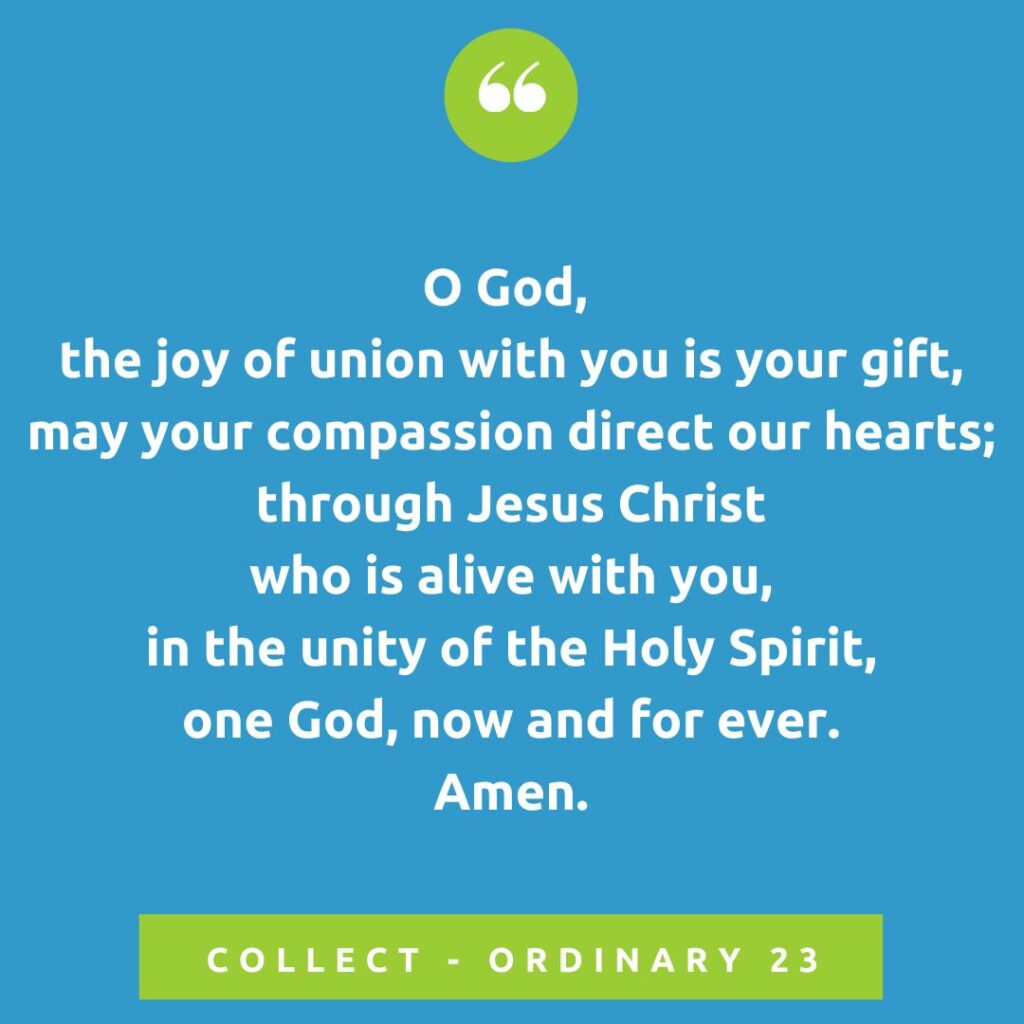
Let us pray (in silence) [that we may love God in our hearts and in our actions]
pause
O God,
the joy of union with you is your gift,
may your compassion direct our hearts;
through Jesus Christ
who is alive with you,
in the unity of the Holy Spirit,
one God, now and for ever.
Amen.
Update: in preparing for next week’s resources, I discovered I had, six years ago, assigned this ancient collect (which is not fixed to any particular Sunday) to next Sunday! So here’s a different translation, commentary, and reflection.
Dirigat corda nostra, quaesumus, Domine, tuae miserationis operatio, quia tibi sine te placere non possumus.
The collect is found in the Gelasian Sacramentary, and in the Sarum rite for Trinity 19. It is used in Anglican Churches: TEC; CofE; Ireland; Canada; Aotearoa, New Zealand & Polynesia… by Roman Catholicism…
In my reworking (above), I thought that the common Anglican translation, “without you we are not able to please you”, makes little contemporary sense. It appears like saying, “Bob, if you didn’t exist, I couldn’t be your friend – without you, I couldn’t be with you!” Roman Catholicism’s ICEL makes it “without your grace we cannot find favour in your sight.” I think “the joy of union with you is your gift” expresses the idea in an attractive, contemporary way.
1549 Book of Common Prayer:
O GOD, for asmuche as without thee, we are not able to please thee; Graunte that the workyng of thy mercie maye in all thynges directe and rule our heartes; Through Jesus Christ our Lorde.
O GOD, forasmuch as without thee we are not able to please thee; Mercifully grant, that thy Holy Spirit may in all things direct and rule our hearts; through Jesus Christ our Lord. Amen.
ICEL 1973:
Lord, guide us in your gentle mercy, for left to ourselves we cannot do your will.
Current ICEL
May the working of your mercy, O Lord, we pray, direct our hearts aright, for without your grace we cannot find favor in your sight.
new translation Saturday Lent 4
Almighty God,
you have called us to serve you,
yet without your grace
we are not able to please you;
mercifully grant that your Holy Spirit
may in all things direct and rule our hearts;
through Jesus Christ our Lord
who is alive with you
in the unity of the Holy Spirit,
one God now and for ever.
Amen.
NZPB p. 612b
O God,
because without you we are not able to please you,
mercifully grant that your Holy Spirit may in all things
direct and rule our hearts;
through Jesus Chrsit our Lord,
who lives and reigns with you and the Holy Spirit,
one God, now and for ever. Amen.
BCP (USA) p.233
O God, forasmuch as without you
we are not able to please you;
mercifully grant that your Holy Spirit
may in all things direct and rule our hearts;
through Jesus Christ your Son our Lord,
who is alive and reigns with you,
in the unity of the Holy Spirit,
one God, now and for ever.
Common Worship (CofE) Nineteenth Sunday after Trinity
This collect is for the fourteenth of the sixteen Sunday masses in the Gelasian sacramentary (#1230). For the Gregorian (effectively) (#1183), Sarum and 1549-1928 Prayer Books it is the collect for the nineteenth Sunday after Trinity.
Dirigat corda nostra quaesumus Domine tuae miserationis operatio, quia tibi sine te placere non possumus. Per Dominum nostrum Jesum Christum filium tuum, qui tecum vivit et regnat in unitate Spiritus sancti Deus. Per omnia secula seculorum, Amen.
[Literally: Direct our hearts, Lord, we beseech you, by the working of your mercy, for without you we are not able to please you.” 1549 has:
O GOD, for asmuche as without thee, we are not able to please thee; Graunte that the workyng of thy mercie maye in all thynges directe and rule our heartes; Through Jesus Christ our Lorde.
The 1662 revisers changed the working of God’s mercy to the Holy Spirit and added the word “rule”. NZ added the concept “you have called us to serve you”.
There is much in this collect that bears reflection: the purpose of life is not to “be good” but to please God. God is the goal and the means, the destination and the journey.
